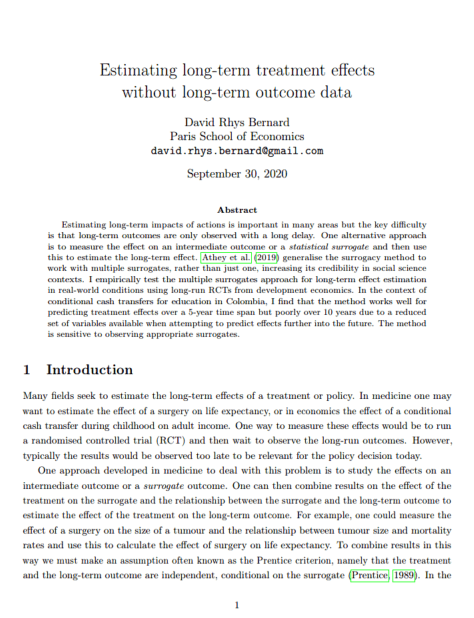Estimating long-term treatment effects without long-term outcome data
David Rhys Bernard (Paris School of Economics)
GPI Working Paper No. 11-2020
This paper has been awarded the paper prize of the 2019 Early Career Conference Programme.
Estimating long-term impacts of actions is important in many areas but the key difficulty is that long-term outcomes are only observed with a long delay. One alternative approach is to measure the effect on an intermediate outcome or a statistical surrogate and then use this to estimate the long-term effect. Athey et al. (2019) generalise the surrogacy method to work with multiple surrogates, rather than just one, increasing its credibility in social science contexts. I empirically test the multiple surrogates approach for long-term effect estimation in real-world conditions using long-run RCTs from development economics. In the context of conditional cash transfers for education in Colombia, I find that the method works well for predicting treatment effects over a 5-year time span but poorly over 10 years due to a reduced set of variables available when attempting to predict effects further into the future. The method is sensitive to observing appropriate surrogates.
Other working papers
Are we living at the hinge of history? – William MacAskill (Global Priorities Institute, Oxford University)
In the final pages of On What Matters, Volume II, Derek Parfit comments: ‘We live during the hinge of history… If we act wisely in the next few centuries, humanity will survive its most dangerous and decisive period… What now matters most is that we avoid ending human history.’ This passage echoes Parfit’s comment, in Reasons and Persons, that ‘the next few centuries will be the most important in human history’. …
The freedom of future people – Andreas T Schmidt (University of Groningen)
What happens to liberal political philosophy, if we consider not only the freedom of present but also future people? In this article, I explore the case for long-term liberalism: freedom should be a central goal, and we should often be particularly concerned with effects on long-term future distributions of freedom. I provide three arguments. First, liberals should be long-term liberals: liberal arguments to value freedom give us reason to be (particularly) concerned with future freedom…
Time discounting, consistency and special obligations: a defence of Robust Temporalism – Harry R. Lloyd (Yale University)
This paper defends the claim that mere temporal proximity always and without exception strengthens certain moral duties, including the duty to save – call this view Robust Temporalism. Although almost all other moral philosophers dismiss Robust Temporalism out of hand, I argue that it is prima facie intuitively plausible, and that it is analogous to a view about special obligations that many philosophers already accept…

